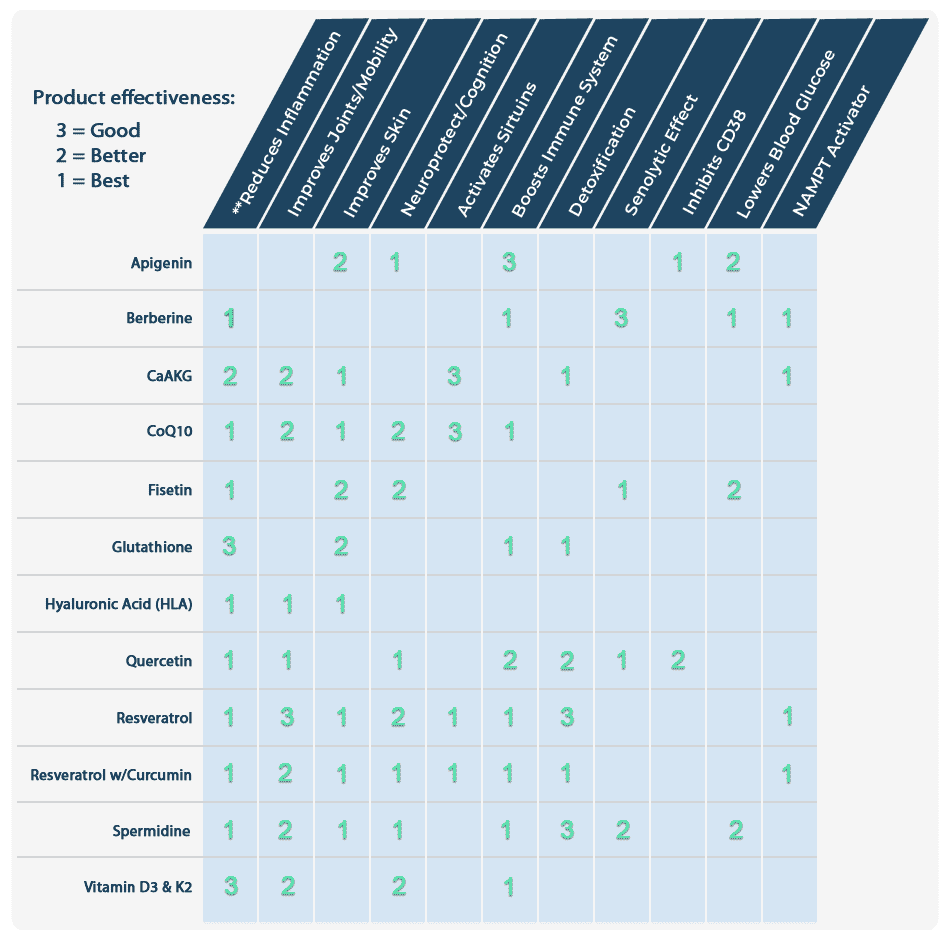CD38 Increases as We Age and Drives Down NAD+ Levels
- CD38 is an enzyme that responds to inflammation, and consumes NAD+.
- Researchers have long known that CD38 levels increase, and that NAD+ decreases as we age.
- A 2016 study found that the increased levels of CD38 are a primary driver of decreasing levels of NAD+ (1).
Inhibition of CD38 Increases NAD+ and Extends Lifespan and Healthspan
Two recent studies have found that inhibition of CD38 (with 78c or PCC1) increase NAD+ levels and result in significant increases in lifespan and healthspan in mice (2, 3)
“we show that the CD38 inhibitor 78c increases lifespan and healthspan of naturally aged mice.”
“In addition to a 10% increase in median survival, 78c improved exercise performance, endurance, and metabolic function in mice”
“aged mice (2 years old) had lower tissue NAD+ levels, and worse glucose tolerance compared with younger mice. 78c promoted a significant increase in NAD+ levels in tissues of aged mice” (r)
Apigenin Inhibits CD38 and Increases NAD+
This study found that Apigenin inhibits CD38 levels, leading to increased NAD+ levels, resulting in numerous health benefits (4)
“Apigenin reduced senescence-associated activity and promoted cell growth”“Apigenin also increased the activation ratio of silent information regulator 1 (SIRT1), and inhibited CD38 activity in a concentration-dependent manner.”“Our findings suggest that apigenin is a promising phytochemical for reducing the impact of senescent cells”
Liposomal Apigenin
LIPO Apigenin™ is a sustained-released liposomal delivery system that provides superior absorption of Apigenin in easy-to-swallow capsules.
Our process encapsulates and delivers Apigenin intracellularly in its complete form where it can be absorbed and utilized rather than being destroyed in the stomach.
Decrease in Senescent Cells Lowers CD38 and Increases NAD+ Levels
As we age, we accumulate senescent or “zombie” cells, cells that have reached their limit of cell division and would normally be swept away and replaced by younger cells. Instead, these cells hang around and begin to secrete toxins called SASP factors which increase systemic inflammation, one of the hallmarks of aging.
This recent research found that rising levels of inflammation cause an increase in CD38, causing systemic NAD+ levels to drop.
“Our data suggest a link between cellular senescence and NAD+ decline in which SASP-mediated upregulation of CD38 can disrupt cellular NAD+ homeostasis.” (5)
Senolytics such as Fisetin, Quercetin, and Spermidine that target senescent cells lower CD38 and increase NAD+

Multiple Pathways to Increase NAD+
NAD+ Precursors
Supplemention with NAD+ precursors does increase NAD+ levels, with this new research finding NMN increases NAD+ levels by 300% in humans.
NAD+ Preservers
Limiting consumption of NAD+ by decreasing Inflammation, Senescent cells, and excessive inflammation is a complementary strategy that we highly recommend.
- Anti-Inflammatories
- CD38 inhibitors
- Senolytics
We believe targeting multiple pathways to increase NAD+ is the safest and most effective protocol, so offer products that work well together instead of using a single product.
